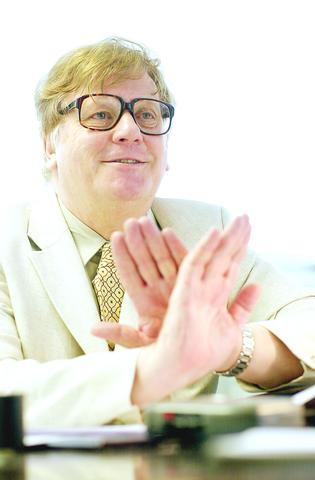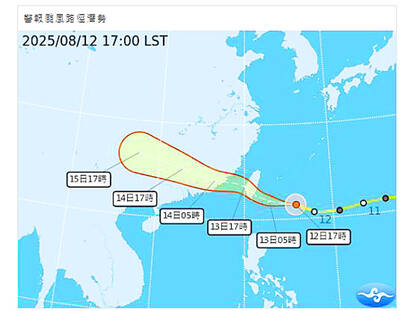Taipei Times: Although the official report on Shanghai CeBIT is not out yet, could you give our readers an idea of what went on there? Many officials in Taiwan fear the show could upstage Computex as Shanghai becomes an electronics manufacturing center.
Dieter Neumann: Our CEO, who went to the [Shanghai] show, said that the visitor turnout and media interest was beyond our expectations, despite the fact Shanghai had the worst typhoon and flooding in over 100 years. The whole city was under water, but the [exhibition] halls were still crowded right from the opening ceremony to the end.

PHOTO: CHEN CHENG-CHANG, TAIPEI TIMES
There were over 384 reporters which is a good turnout for such an event in Shanghai, but it's a far cry from the 10,000 we had at CeBIT in Hanover [Europe's largest computer and electronics trade show]. But even one reporter from Taiwan said he was surprised at how many countries, how many media came, even from down in Australia, to see the event.
TT: Should officials in charge of Computex Taipei be afraid of Shanghai CeBIT?
Neumann: No. The opinion of exhibitors was split in two categories. Those exhibitors who already have operations in China -- and this is nearly half of the industry here -- they were delighted about the business opportunity because they knew it would be an import fair targeted at the Chinese market.
Those exhibitors who knew China found their expectations met and those who only knew CeBIT Hanover were not so delighted because they expected more buyers from foreign countries to come. This did not happen. Why should a buyer from Europe or America go to a show in China with 521 exhibitors when he will have 8,100 in CeBIT [Hanover] this year and 8,290 next year when we add another [exhibition] hall?
So, this year, [Shanghai CeBIT] targeted the Chinese market, while Computex is not for consumers -- it is a show which attracts foreign buyers. I think that Computex officials returned from China relieved.
TT: What do you think of the potential growth prospects for CeBIT Shanghai?
Neumann: A lot of our exhibitors want to double their space for next year and a lot of those companies that had a wait-and-see attitude this year will be there next year, so it will be a gigantic show next year.
It was quite natural that a lot of people did not attend for the first time, because many exhibitors, including Acer Inc (宏電), have a strict policy to never attend a first-time show. This is a company policy. CETRA [China External Trade Development Council] will never organize a joint exhibit on a first-time foreign trade show and the Ministry of Economic Affairs will never subsidize any Chinese contingent to a fair with no track record.
The number of visitors was 25,384, and out of them, 4,303 were from abroad. Most of them were not buyers, but just observers. To export a trademark like CeBIT to another country was an experiment. The outcome was not predictable, but it was an experiment in a country with such a market structure, so when I say observers ... some are just curious, some are malicious. They push us into a snake pit and watch from the top to see if we survive.
TT: Switching gears a bit, you said there would be a biotechnology trade show in Germany in October, Biotechnica ... ?
Neumann: Since 1985, every two years we have held Biotechnica. It differs from BIO in San Diego [North America's largest biotechnology industry show] in a substantial way. Biotechnica was a trade show from the beginning on, and a congress program developed slowly, where a company lectures first and there are academic lectures. Now, it is a trade show accompanied by a congress.
These American types of congresses are different. We had an observer in San Diego, and he said the show is living by networking. People who know each other slap each other's shoulders and meet for cocktail parties. They have the big congress and the trade show in the hall is just a supplement for the organizer [of the show] to make some money. Nobody in his right mind, after all these meetings and lectures, goes into the hall to see a couple of knick-knacks, and this is different.
We were expecting to close the show for October with 924 exhibitors as opposed to 811 before, but my latest information says the number of exhibitors is now 1022. This is a lot of academic institutions, research organizations and private companies from small equipment makers on up to [the point where it becomes] a concern. One thousand twenty-two is a lot to visit for four days and there is also a congress.
Most of the substantial talks will be at the stands, where you really have the top brass from the companies attending. Not like the US type of trade shows where you meet in hotel rooms and conference rooms and the stands are just there for the public. Germans are too serious for that. America is considered the country with the most advanced biotechnology, but Germany is ranked number three in the world.
We are a little bit behind with modern biotechnology because of concerns with manipulating genes and human clones and manipulating food and our [current] government is against all this. There are a lot of protests in Germany, and if I were to evaluate it I would say it is those people who say "well, I don't really know what is at stake, but I am against it" -- those type of people.
TT: Is there a Taiwan delegation going to Biotechnica?
Neumann: Yesterday, the Ministry of Economic Affairs received three invitations written by our Minister of Economics, of our state [Lower Saxony, Germany], not of the German nation. They were sent to people who have indicated interest in attending the fair. We would like to give them VIP treatment if they come, and make their stay is as worthwhile as possible.
In terms of our exhibitors, bioengineering companies are come first, then equipment makers, then bioinformatics and services, and then medicines.
Germany is a little bit behind in terms of promoting events through government agencies. Obviously, in BIO San Diego, the Americans did a much better job. Their de facto ambassador here extended an invitation ... I am amazed and look with a bit of envy at how much diplomatic representatives care for boosting that nation's business. We don't have it always, but it worked this time, we have these invitations.
Anyway, we will have two Taiwan exhibitors at this show and hopefully we will have an official delegation coming over. People like ITRI [Industrial Technology Research Institute] and the National Science Council have offices over there, so they already know about [Biotechnica]. They know a good thing when they see it. Next year at this time, we will already be promoting the next event and then it will be bigger -- we will begin earlier.

DEFENSE: The first set of three NASAMS that were previously purchased is expected to be delivered by the end of this year and deployed near the capital, sources said Taiwan plans to procure 28 more sets of M-142 High Mobility Artillery Rocket Systems (HIMARS), as well as nine additional sets of National Advanced Surface-to-Air Missile Systems (NASAMS), military sources said yesterday. Taiwan had previously purchased 29 HIMARS launchers from the US and received the first 11 last year. Once the planned purchases are completed and delivered, Taiwan would have 57 sets of HIMARS. The army has also increased the number of MGM-140 Army Tactical Missile Systems (ATACMS) purchased from 64 to 84, the sources added. Each HIMARS launch pod can carry six Guided Multiple Launch Rocket Systems, capable of

GET TO SAFETY: Authorities were scrambling to evacuate nearly 700 people in Hualien County to prepare for overflow from a natural dam formed by a previous typhoon Typhoon Podul yesterday intensified and accelerated as it neared Taiwan, with the impact expected to be felt overnight, the Central Weather Administration (CWA) said, while the Directorate-General of Personnel Administration announced that schools and government offices in most areas of southern and eastern Taiwan would be closed today. The affected regions are Tainan, Kaohsiung and Chiayi City, and Yunlin, Chiayi, Pingtung, Hualien and Taitung counties, as well as the outlying Penghu County. As of 10pm last night, the storm was about 370km east-southeast of Taitung County, moving west-northwest at 27kph, CWA data showed. With a radius of 120km, Podul is carrying maximum sustained

Tropical Storm Podul strengthened into a typhoon at 8pm yesterday, the Central Weather Administration (CWA) said, with a sea warning to be issued late last night or early this morning. As of 8pm, the typhoon was 1,020km east of Oluanpi (鵝鑾鼻), Taiwan’s southernmost tip, moving west at 23kph. The storm carried maximum sustained winds of 119kph and gusts reaching 155kph, the CWA said. Based on the tropical storm’s trajectory, a land warning could be issued any time from midday today, it added. CWA forecaster Chang Chun-yao (張竣堯) said Podul is a fast-moving storm that is forecast to bring its heaviest rainfall and strongest

TRAJECTORY: The severe tropical storm is predicted to be closest to Taiwan on Wednesday and Thursday, and would influence the nation to varying degrees, a forecaster said The Central Weather Administration (CWA) yesterday said it would likely issue a sea warning for Tropical Storm Podul tomorrow morning and a land warning that evening at the earliest. CWA forecaster Lin Ting-yi (林定宜) said the severe tropical storm is predicted to be closest to Taiwan on Wednesday and Thursday. As of 2pm yesterday, the storm was moving west at 21kph and packing sustained winds of 108kph and gusts of up to 136.8kph, the CWA said. Lin said that the tropical storm was about 1,710km east of Oluanpi (鵝鑾鼻), Taiwan’s southernmost tip, with two possible trajectories over the next one